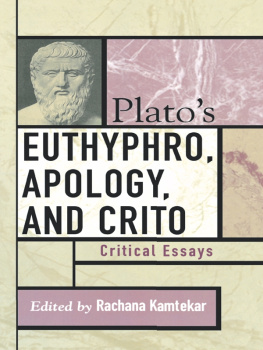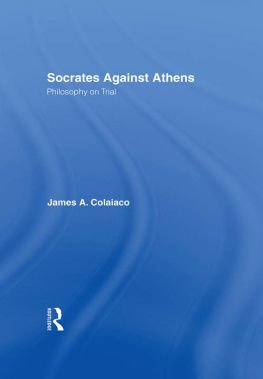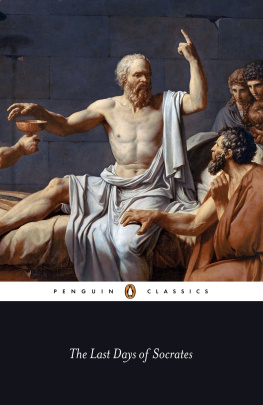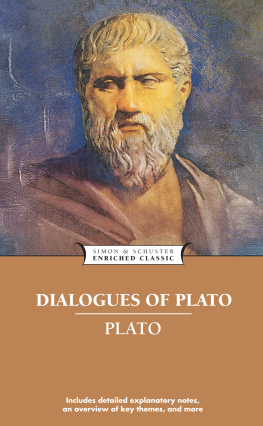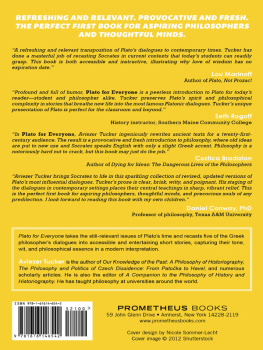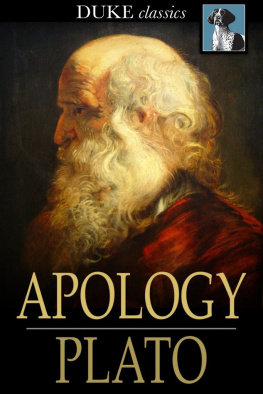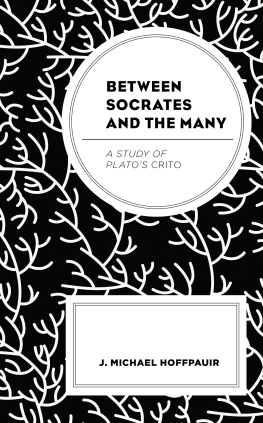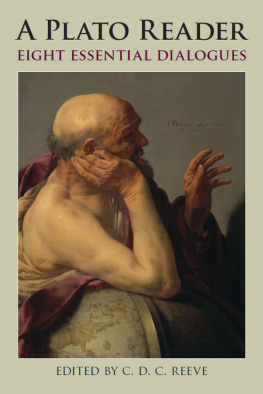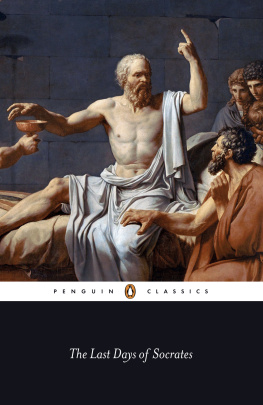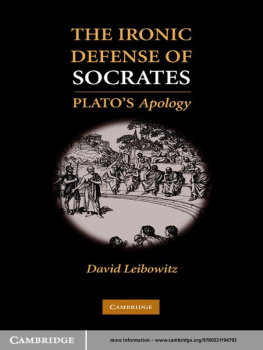Bostock David - Platos Euthyphro, Apology, and Crito
Here you can read online Bostock David - Platos Euthyphro, Apology, and Crito full text of the book (entire story) in english for free. Download pdf and epub, get meaning, cover and reviews about this ebook. City: Lanham;Maryland;Oxford;England, year: 2005;2013, publisher: Rowman & Littlefield Publishers, genre: Science. Description of the work, (preface) as well as reviews are available. Best literature library LitArk.com created for fans of good reading and offers a wide selection of genres:
Romance novel
Science fiction
Adventure
Detective
Science
History
Home and family
Prose
Art
Politics
Computer
Non-fiction
Religion
Business
Children
Humor
Choose a favorite category and find really read worthwhile books. Enjoy immersion in the world of imagination, feel the emotions of the characters or learn something new for yourself, make an fascinating discovery.
- Book:Platos Euthyphro, Apology, and Crito
- Author:
- Publisher:Rowman & Littlefield Publishers
- Genre:
- Year:2005;2013
- City:Lanham;Maryland;Oxford;England
- Rating:5 / 5
- Favourites:Add to favourites
- Your mark:
- 100
- 1
- 2
- 3
- 4
- 5
Platos Euthyphro, Apology, and Crito: summary, description and annotation
We offer to read an annotation, description, summary or preface (depends on what the author of the book "Platos Euthyphro, Apology, and Crito" wrote himself). If you haven't found the necessary information about the book — write in the comments, we will try to find it.
Platos Euthyphro, Apology, and Crito — read online for free the complete book (whole text) full work
Below is the text of the book, divided by pages. System saving the place of the last page read, allows you to conveniently read the book "Platos Euthyphro, Apology, and Crito" online for free, without having to search again every time where you left off. Put a bookmark, and you can go to the page where you finished reading at any time.
Font size:
Interval:
Bookmark:
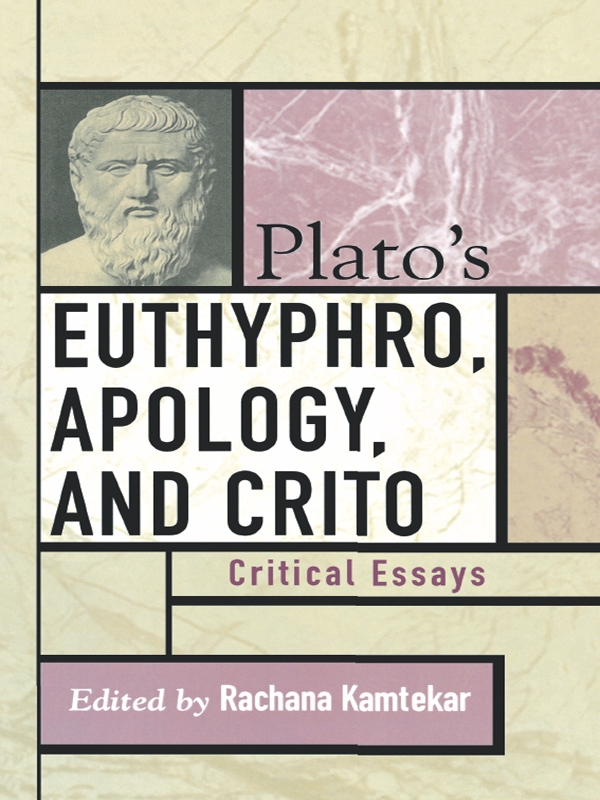
Bostock, David. The Interpretation of Platos Crito, is reprinted from Phronesis vol. XXXV no. 1 (1990), pp. 1-20, with kind permission of Koninklijke Brill NV, Leider, The Netherlands, Phronesic, 1990.
Burnyeat, Myles. The Impiety of Socrates is reprinted from Ancient Philosophy vol. 17 no. 1 (1997), pp. 112, by permission of the journal and the author.
Cohen, S. Marc. Socrates on the Definition of Piety: Euthyphro 10A11B is reprinted from Journal of the History of Philosophy 9 (1971), 113, by permission of the Johns Hopkins University Press and the author.
de Strycker, E. and S. R. Slings. Plato s Apology of Socrates is reprinted from Plato s Apology of Socrates (Leiden: Brill, 1994), pp. 125. Copyright 1994 by Brill Academic Publishers. Reprinted by permission of Brill Academic Publishers via the Copyright Clearance Center.
Geach, P. T. Platos Euthyphro: An Analysis and Commentary, is reprinted from The Monist, vol. 50 no. 3 (July 1966), pp. 36982. Copyright c. 1966 The Monist: An International Quarterly Journal of General Philosophical Inquiry, Peru, Illinois, U.S.A. 61354. Reprinted by permission.
Harte, Verity. Conflicting Values in Platos Crito is reprinted from Archiv fr Geschichte der Philosophie vol. 81 no. 2, pp. 11747, by permission of the journal and the author.
Irwin, T. H. Was Socrates against Democracy? is based on the article Socrates and Athenian Democracy, published in Philosophy and Public Affairs, vol. 32 i.1 (1989).
Kraut, Richard. Dokimasia, Satisfaction, and Agreement, is reprinted from Richard Kraut, Socrates and the State (pp. 14993) c. 1984 Princeton University Press by permission of Princeton University Press and the author.
McPherran, Mark L. Justice and Pollution in the Euthyphro is reprinted from Apeiron: A Journal for Ancient Philosophy and Science , vol. 35 (2002), pp. 10527, by permission of Academic Printing and Publishing and the author.
Morrison, Donald. On the Alleged Historical Reliability of Platos Apology is reprinted from Archiv fr Geschichte der Philosophie vol. 82 no. 3, pp. 23565, by permission of the journal and the author.
Smith, N. and T. Brickhouse. Socrates and Obedience to the Law is reprinted from Apeiron: A Journal for Ancient Philosophy and Science, vol. 18 (1984), pp. 1018, by permission of Academic Printing and Publishing and the authors.
Vlastos, Gregory. Socratic Piety is reprinted from Socrates , Ironist and Moral Philosopher, pp. 157178, edited by Gregory Vlastos. Copyright c. 1991 Cambridge University Press. Used by permission of the publisher, Cornell University Press.
Rachana Kamtekar is assistant professor of philosophy at the University of Arizona. She is the author of various articles on ancient ethics, politics and psychology. She is co-editor, with Sara Rappe, of the forthcoming Blackwell Companion to Socrates.
David Bostock has been Fellow and Tutor in Philosophy at Merton College, Oxford, and Lecturer in Philosophy at the University of Oxford since 1968. His publications include Platos Phaedo, Platos Theaetetus, Aristotles Metaphysics, Books Z and H, and Aristotles Ethics.
Thomas C. Brickhouse is professor of philosophy at Lynchburg College. He is the author (with Nicholas D. Smith) of three books, Socrates on Trial, Platos Socrates, and Socrates the Philosopher , as well as of many articles.
M. F. Burnyeat is Senior Research Fellow at All Souls College, Oxford University and formerly Laurence Professor of Ancient Philosophy at Cambridge University. He is the author of A Map of Metaphysics Zeta, The Theaetetus of Plato and numerous articles on a wide variety of topics in ancient philosophy.
S. Marc Cohen is professor of philosophy at the University of Washington. He is co-author of Ammonius on Aristotles Categories and co-editor of Readings in Ancient Greek Philosophy . His articles on Plato and Aristotle have appeared in various journals and anthologies.
Peter Geach is Honorary Fellow of Balliol College, Oxford University. His publications include Mental Acts, Reference and Generality, God and the Soul, and, most recently, Truth and Hope.
Verity Harte is lecturer in philosophy at Kings College London. She is the author of Plato on Parts and Wholes and of articles on various topics in ancient philosophy.
Terence Irwin is Susan Linn Sage Professor of Philosophy and Humane Letters, Cornell University. He is the author of Platos Gorgias (translation and notes), Aristotles Nicomachean Ethics (translation and notes), Aristotles First Principles, Classical Thought, and Platos Ethics.
Richard Kraut is professor of philosophy and Classics and holds the Morrison Chair in the Humanities at Northwestern University. Among his publications are Aristotle: Political Philosophy, Aristotle on the Human Good, and Socrates and the State . He also edited the Cambridge Companion to Plato.
Donald Morrison is professor of philosophy and Classical Studies at Rice University. His recent publications include articles on Socrates, classical political philosophy, and philosophical method in later Greek philosophy. He is editor of the forthcoming Cambridge Companion to Socrates.
Mark L. McPherran is professor of philosophy at the University of Maine at Farmington. He is the author of The Religion of Socrates , the editor of Wisdom, Ignorance, and Virtue: New Essays in Socratic Studies and Recognition, Remembrance, and Reality: New Essays on Platos Epistemology and Metaphysics, and many articles on Socrates, Plato, and ancient skepticism.
S. R. Slings was Chair of Greek at the Free University at Amsterdam. His publications include the new Oxford Classical Text of Platos Republic and an edition with commentary of Platos Clitophon .
Nicholas D. Smith is the James F. Miller Professor of Humanities at Lewis & Clark College. He is the author, coauthor, editor, or coeditor of numerous papers and books in several areas of Greek philosophy and literature, and the coauthor with Thomas C. Brickhouse of Socrates on Trial, Platos Socrates, The Philosophy of Socrates, and Plato and the Trial of Socrates.
E. de Strycker , S. J. , taught at St. Ignatius College at the University of Antwerp. His publications include various articles on Socrates and Plato.
Gregory Vlastos held various distinguished professorial posts during his lifetime and wrote Socrates, Ironist and Moral Philosopher and Platos Universe; some of his most influential papers are collected in his Platonic Studies.
Mark L. McPherran
R EADERS OF PLATOS EUTHYPHRO TYPICALLY FOCUS their attention on Socrates elenctic examination of Euthyphros five attempted definitions of piety () (1) piety is proceeding against whomever does injustice (5d-6e), (2) piety is what is loved by the gods (6e-9d), (3) piety is what is loved by all the gods (9e-11b), (4) piety is that part of justice which assists the gods to produce their most beautiful product (11e-14b), and (5) piety is an art of prayer and sacrifice (14b-15c). But although these argumentative episodes do very much form the explicit philosophical substance of the dialogue, the complex motivations which drive its participants also deserve careful scrutiny if we are to fully understand both them and the overall import of the dialogue. It seems clear that Plato himself wishes to provoke this sort of examination, since he provides an unusually complex and long dramatic prologue, amounting to roughly one-third of the dialogues length (one whose themes continuously inform the subsequent inquiry into piety). We would do well, then, to investigate one of the prologues most puzzling and yet least-discussed elements; namely, Euthyphros assertion that he is justified in prosecuting his father out of a concern for the the pollutionthat attends homicides of the sort he imagines his father to have committed, and because impartial justice demands it (4b7-c3). In this paper I shall argue for a novel account of this appeal, one which shows Euthyphro to be more morally and theologically progressive than he has been thought but which also freshly illuminates the way in which the Euthyphro serves as an indirect, nonforensic defense of Socrates.
Font size:
Interval:
Bookmark:
Similar books «Platos Euthyphro, Apology, and Crito»
Look at similar books to Platos Euthyphro, Apology, and Crito. We have selected literature similar in name and meaning in the hope of providing readers with more options to find new, interesting, not yet read works.
Discussion, reviews of the book Platos Euthyphro, Apology, and Crito and just readers' own opinions. Leave your comments, write what you think about the work, its meaning or the main characters. Specify what exactly you liked and what you didn't like, and why you think so.

